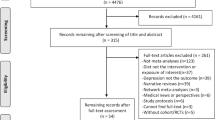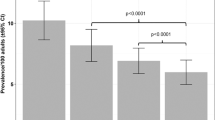Abstract
Background/objectives
Recent epidemiological studies have examined associations between various types of non-alcoholic beverage consumption and risk of depression, but the associations were inconsistent. To provide a quantitative assessment of this association, we performed a systematic review and meta-analysis of observational studies.
Subjects/methods
We searched PubMed and Web of Science databases through February 2017 for eligible studies and examined the reference lists of the retrieved articles. A random-effects model was used to calculate pooled relative risks (RR) with 95% CIs after adjusting for important confounders.
Results
We identified fifteen observational studies (9 cross-sectional studies; 6 prospective studies) of beverage consumption and depression, including 20,572 cases of depression among 347,691 participants. For coffee and tea consumption, the pooled RRs of depression for the high vs. low categories of consumption were 0.73 (95% CI 0.59–0.90) and 0.71 (95% CI 0.55–0.91), respectively. For soft drinks, however, the pooled RR for the high vs. low category of consumption was 1.36 (95% CI 1.24–1.50). The inverse association with coffee or tea consumption and the positive association with soft drink consumption for risk of depression did not vary by gender, country, high consumption category, and adjustment factors such as alcohol, smoking and physical activity.
Conclusions
Our findings suggest that high consumption of coffee and tea may reduce the risk of depression, while high consumption of soft drinks may increase the risk of depression. Further well-designed large prospective studies are needed to provide definitive evidence to address the effects of various types of beverages on risk of depression.
This is a preview of subscription content, access via your institution
Access options
Subscribe to this journal
Receive 12 print issues and online access
$259.00 per year
only $21.58 per issue
Buy this article
- Purchase on Springer Link
- Instant access to full article PDF
Prices may be subject to local taxes which are calculated during checkout




Similar content being viewed by others
References
THE GLOBAL BURDEN OF DISEASE 2004 UPDATE. http://www.who.int/healthinfo/global_burden_disease/GBD_report_2004update_full.pdf?ua=1. Accessed on 10 Mar 2017.
Krogh J, Nordentoft M, Sterne JA, Lawlor DA. The effect of exercise in clinically depressed adults: systematic review and meta-analysis of randomized controlled trials. J Clin Psychiatry. 2011;72:529–38.
Zhai L, Zhang Y, Zhang D. Sedentary behaviour and the risk of depression: a meta-analysis. Br J Sports Med. 2015;49:705–9.
Breslau N, Peterson EL, Schultz LR, Chilcoat HD, Andreski P. Major depression and stages of smoking. A longitudinal investigation. Arch Gen Psychiatry. 1998;55:161–6.
Wang PW, Lin HC, Yeh YC, Liu TL, Yen CF. The relation of substance use with different levels of depressive symptoms and the moderating effect of sex and age in Taiwanese adolescents. Compr Psychiatry. 2012;53:1013–20.
Li Y, Lv MR, Wei YJ, Sun L, Zhang JX, Zhang HG, et al. Dietary patterns and depression risk: a meta-analysis. Psychiatry Res. 2017;253:373–82.
Lopez-Garcia E, Schulze MB, Fung TT, Meigs JB, Rifai N, Manson JE, et al. Major dietary patterns are related to plasma concentrations of markers of inflammation and endothelial dysfunction. Am J Clin Nutr. 2004;80:1029–35.
Behr GA, Moreira JC, Frey BN. Preclinical and clinical evidence of antioxidant effects of antidepressant agents: implications for the pathophysiology of major depressive disorder. Oxid Med Cell Longev. 2012;2012:1–13.
Luppino FS, de Wit LM, Bouvy PF, Stijnen T, Cuijpers P, Penninx BW, et al. Overweight, obesity, and depression: a systematic review and meta-analysis of longitudinal studies. Arch Gen Psychiatry. 2010;67:220–9.
Popkin BM, Armstrong LE, Bray GM, Caballero B, Frei B, Willett WC. A new proposed guidance system for beverage consumption in the United States. Am J Clin Nutr. 2006;83:529–42.
Frary CD, Johnson RK, Wang MQ. Food sources and intakes of caffeine in the diets of persons in the United States. J Am Diet Assoc. 2005;105:110–3.
Lara DR. Caffeine, mental health, and psychiatric disorders. J Alzheimers Dis. 2010;20:S239–248.
Kaasinen V, Aalto S, Nagren K, Rinne JO. Dopaminergic effects of caffeine in the human striatum and thalamus. Neuroreport. 2014;15:281–5.
Dorea JG, Da Costa TH. Is coffee a functional food? Br J Nutr. 2005;93:773–82.
Dos Santos MD, Almeida MC, Lopes NP, de Souza GE. Evaluation of the antiinflammatory, analgesic and antipyretic activities of the natural polyphenol chlorogenic acid. Biol Pharm Bull. 2006;29:2236–40.
Zhu WL, Shi HS, Wei YM, Wang SJ, Sun CY, Ding ZB, et al. Green tea polyphenols produce antidepressant-like effects in adult mice. Pharmacol Res. 2012;65:74–80.
Kimura K, Ozeki M, Juneja LR, Ohira H. L-Theanine reduces psychological and physiological stress responses. Biol Psychol. 2007;74:39–45.
Nagasawa K, Aoki H, Yasuda E, Nagai K, Shimohama S, Fujimoto S. Possible involvement of group I mGluRs in neuroprotective effect of theanine. Biochem Biophys Res Commun. 2004;320:116–22.
Whitehouse CR, Boullata J, McCauley LA. The potential toxicity of artificial sweeteners. AAOHN J. 2008;56:251–9.
Humphries P, Pretorius E, Naude H. Direct and indirect cellular effects of aspartame on the brain. Eur J Clin Nutr. 2008;62:451–62.
Timonen M, Laakso M, Jokelainen J, Laakso M, Härkönen P, Koskela P, et al. Insulin resistance and depression: cross sectional study. BMJ. 2005;330:17–18.
Preiss K, Brennan L, Clarke D. A systematic review of variables associated with the relationship between obesity and depression. Obes Rev. 2013;14:906–18.
Hintikka J, Tolmunen T, Honkalampi K, Haatainen K, Koivumaa-Honkanen H, Tanskanen A, et al. Daily tea drinking is associated with a low level of depressive symptoms in the Finnish general population. Eur J Epidemiol. 2005;20:359–63.
Niu K, Hozawa A, Kuriyama S, Ebihara S, Guo H, Nakaya N, et al. Green tea consumption is associated with depressive symptoms in the elderly. Am J Clin Nutr. 2009;90:1615–22.
Shi Z, Taylor AW, Wittert G, Goldney R, Gill TK. Soft drink consumption and mental health problems among adults in Australia. Public Health Nutr. 2010;13:1073–9.
Chen X, Lu W, Zheng Y, Gu K, Chen Z, Zheng W, et al. Exercise, tea consumption, and depression among breast cancer survivors. J Clin Oncol. 2010;28:991–8.
Ruusunen A, Lehto SM, Tolmunen T, Mursu J, Kaplan GA, Voutilainen S. Coffee, tea and caffeine intake and the risk of severe depression in middle-aged Finnish men: the Kuopio Ischaemic Heart Disease Risk Factor Study. Public Health Nutr. 2010;13:1215–20.
Lucas M, Mirzaei F, Pan A, Okereke OI, Willett WC, O’Reilly EJ, et al. Coffee, caffeine, and risk of depression among women. Arch Intern Med. 2011;171:1571–8.
Feng L, Li J, Kua EH, Lee TS, Yap KB, John Rush A, et al. Association between tea consumption and depressive symptoms in older Chinese adults. J Am Geriatr Soc. 2012;60:2358–60.
Pham NM, Nanri A, Kurotani K, Kuwahara K, Kume A, Sato M, et al. Green tea and coffee consumption is inversely associated with depressive symptoms in a Japanese working population. Public Health Nutr. 2014;17:625–33.
Tsai AC, Chi SH, Wang JY. Cross-sectional and longitudinal associations of lifestyle factors with depressive symptoms in ≥ 53-year old Taiwanese—results of an 8-year cohort study. Prev Med. 2013;57:92–97.
Feng L, Yan Z, Sun B, Cai C, Jiang H, Kua EH, et al. Tea consumption and depressive symptoms in older people in rural China. J Am Geriatr Soc. 2013;61:1943–7.
Zahedi H, Kelishadi R, Heshmat R, Motlagh ME, Ranjbar SH, Ardalan G, et al. Association between junk food consumption and mental health in a national sample of Iranian children and adolescents: the CASPIAN-IV study. Nutrition. 2014;30:1391–7.
Guo X, Park Y, Freedman ND, Sinha R, Hollenbeck AR, Blair A, et al. Sweetened beverages, coffee, and tea and depression risk among older US adults. PLoS One. 2014;9:e94715.
Yu B, He H, Zhang Q, Wu H, Du H, Liu L, et al. Soft drink consumption is associated with depressive symptoms among adults in China. J Affect Disord. 2015;172:422–7.
Park RJ, Moon JD. Coffee and depression in Korea: the fifth Korean National Health and Nutrition Examination Survey. Eur J Clin Nutr. 2015;69:501–4.
Omagari K, Sakaki M, Tsujimoto Y, Shiogama Y, Iwanaga A, Ishimoto M, et al. Coffee consumption is inversely associated with depressive status in Japanese patients with type 2 diabetes. J Clin Biochem Nutr. 2014;55:135–42.
Stroup DF, Berlin JA, Morton SC, Olkin I, Williamson GD, Rennie D, et al. Meta-analysis of observational studies in epidemiology: a proposal for reporting. Meta-analysis Of Observational Studies in Epidemiology (MOOSE) group. JAMA. 2000;283:2008–12.
DerSimonian R, Laird N. Meta-analysis in clinical trials. Control Clin Trials. 1986;7:177–88.
Cochran WG. The combination of estimates from different experiments. Biometrics. 1954;10:101–29.
Higgins JP, Thompson SG, Deeks JJ, Altman DG. Measuring inconsistency in meta-analyses. BMJ. 2003;327:557–60.
Begg CB, Mazumdar M. Operating characteristics of a rank correlation test for publication bias. Biometrics. 1994;50:1088–101.
Sterne JAC, Gavaghan D, Egger M. Publication and related bias in meta-analysis: power of statistical tests and prevalence in the literature. J Clin Epidemiol. 2000;53:1119–29.
Dong X, Yang C, Cao S, Gan Y, Sun H, Gong Y, et al. Tea consumption and the risk of depression: a meta-analysis of observational studies. Aust N Z J Psychiatry. 2015;49:334–45.
Wang L, Shen X, Wu Y, Zhang D. Coffee and caffeine consumption and depression: a meta-analysis of observational studies. Aust N Z J Psychiatry. 2016;50:228–42.
Grosso G, Micek A, Castellano S, Pajak A, Galvano F. Coffee, tea, caffeine and risk of depression: a systematic review and dose-response meta-analysis of observational studies. Mol Nutr Food Res. 2016;60:223–34.
Kaasinen V, Aalto S, Nagren K, Rinne JO. Dopaminergic effects of caffeine in the human striatum and thalamus. Neuroreport. 2004;15:281–5.
McNally L, Bhagwagar Z, Hannestad J. Inflammation, glutamate, and glia in depression: a literature review. CNS Spectr. 2008;13:501–10.
Liu T, Zhong S, Liao X, Chen J, He T, Lai S, et al. A meta-analysis of oxidative stress markers in depression. PLoS One. 2015;10:e0138904.
Unno K, Fujitani K, Takamori N, Takabayashi F, Maeda K, Miyazaki H, et al. Theanine intake improves the shortened lifespan, cognitive dysfunction and behavioural depression that are induced by chronic psychosocial stress in mice. Free Radic Res. 2011;45:966–74.
Levitan EB, Cook NR, Stampfer MJ, Ridker PM, Rexrode KM, Buring JE, et al. Dietary glycemic index, dietary glycemic load, blood lipids, and C-reactive protein. Metabolism. 2008;57:437–43.
Murakami K, Ssaki S, Takahashi Y, Uenishi K, Watanabe T, Kohri T, et al. Dietary glycemic index is associated with decreased premenstrual symptoms in young Japanese women. Nutrition. 2008;24:554–61.
Liu S, Manson JE, Buring JE, Stampfer MJ, Willett WC, Ridker PM. Relation between a diet with a high glycemic load and plasma concentrations of high-sensitivity C-reactive protein in middle-aged women. Am J Clin Nutr. 2002;75:492–8.
Bilici M, Efe H, Koroglu MA, Uydu HA, Bekaroğlu M, Değer O. Antioxidative enzyme activities and lipid peroxidation in major depression: alterations by antidepressant treatments. J Affect Disord. 2001;64:43–51.
Acknowledgements
This work was supported by the Basic Science Research Program through the National Research Foundation of Korea, funded by the Ministry of Science, ICT and Future Planning (NRF-2015R1A1A1A05001362). Funders had no role in the study design, data collection and analysis, decision to publish, or preparation of the manuscript.
Author information
Authors and Affiliations
Corresponding author
Ethics declarations
Conflict of interest
The authors declare that they have no conflict of interest.
Rights and permissions
About this article
Cite this article
Kang, D., Kim, Y. & Je, Y. Non-alcoholic beverage consumption and risk of depression: epidemiological evidence from observational studies. Eur J Clin Nutr 72, 1506–1516 (2018). https://doi.org/10.1038/s41430-018-0121-2
Received:
Revised:
Accepted:
Published:
Issue Date:
DOI: https://doi.org/10.1038/s41430-018-0121-2
This article is cited by
-
Patterns of unhealthy behaviours during adolescence and subsequent anxiety and depression in adulthood: a prospective register linkage study of the HUNT survey and health registries
International Journal of Behavioral Nutrition and Physical Activity (2023)
-
Longitudinal analysis for the risk of depression according to the consumption of sugar-sweetened carbonated beverage in non-diabetic and diabetic population
Scientific Reports (2023)
-
Young women’s food consumption and mental health: the role of employment
BMC Women's Health (2022)
-
Physical activity, sugar-sweetened beverages, whole grain bread and insomnia among adolescents and psychological distress in adulthood: prospective data from the population-based HUNT study
International Journal of Behavioral Nutrition and Physical Activity (2021)
-
Role of dietary factors in the prevention and treatment for depression: an umbrella review of meta-analyses of prospective studies
Translational Psychiatry (2021)



